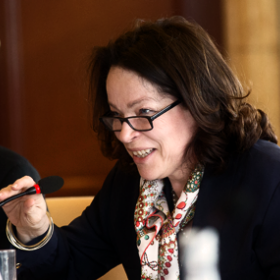
Beate Maeder-Metcalf Leads Panel on Pakistan and the EU in Brussels
EastWest Institute’s Vice President, Regional Security, Dr. Beate Maeder Metcalf moderated this panel, hosted by the Hanns Seidel Foundation of Germany, to engage senior members of Pakistan's Parliament (the Senate) in a dialogue with European institutions at a crucial point in time for Pakistan and the region. Dr. Maeder-Metcalf has lead EWI’s multi-year, multi-stakeholder meetings about the security and economic future of Afghanistan and the region, including Pakistan (The Abu Dhabi Process.)
The May 2013 election in Pakistan saw the first democratic handover of power in its history. Most countries in the region are scheduled to complete their electoral processes in 2014. At the same time, the drawdown of international forces from Afghanistan will be complete by the end of the year, creating uncertainty when the country also faces many challenges, such as energy shortages, sectarian and terrorist violence in the Western region, and radicalization in parts of society due to a youth bulge facing high unemployment.
The goal of the Brussels panel was to promote mutual understanding and to advance a common agenda, as the issues in the region have implications for Europe and the rest of the world. The panel addressed Pakistan's current politics, economy, security issues, and relations with EU and NATO.
The Pakistani delegation was led by the Chairman of the Foreign Affairs Committee, Senator Adeel (Awami National Party), and by Senator Mushahid Sayed, Chairman of the Defense Committee (Pakistan Muslim League, PML-Q). The European Parliament was represented by Mr. Michael Gahler (Member of the EP's Committee on Foreign Affairs, member of EastWest Institute’s Parliamentarian’s Network). NATO was represented by Dr. Stefanie Babst, Head of Strategic Analysis Capability for the NATO Secretary General and Chairman of NATO Military Committee.
On the political front, Pakistani participants stressed that Pakistan is a vibrant democracy, perhaps the freest Muslim democracy in the world, with an independent media and judiciary. Mr. Gahler, who led the European Parliament’s election monitoring mission to Pakistan in 2013, recognized Pakistan’s democratic achievements and emphasized the EU’s continued interest.
Economically, to ensure a prosperous future, Pakistani participants said the country will need to invest more in education. Senator Sayed stressed that the country had the potential to become an economic hub in "Greater South Asia," including India and linking to China.
Addressing the security transition in Afghanistan at the end of 2014, Pakistani participants expressed concern about the effects of what could be perceived as a Western "cut and run.” Dr. Babst of NATO reiterated NATO's continued security commitment to the region, and reminded participants that Pakistan still needs to sign the NATO-Pakistan "Joint Declaration," pending in Islamabad since 2013.

